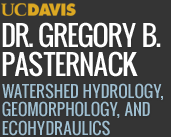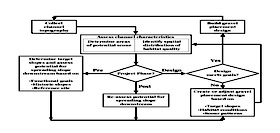Research
The research conducted in the Pasternack Lab addresses the basic science of watershed hydrology, geomorphology, and ecohydraulics as well as the applied societal problems of human alteration to the landscape, river and wetland management, and environmental restoration. The approach used is fundamentally problem driven rather than discipline driven, which is why the totality of projects conducted is broad and draws on diverse concepts and methods. An emphasis is placed on identifying clear, tractable scientific questions and then pursuing work that is transparent and repeatable. The research is also focused on a mechanistic view of the world where the goal of science is to look holistically at a system to identify processes and then characterize and quantify drivers, catalysts, feedbacks, and outcomes of those processes. The world is complex, so we do not look for overly simplistic answers; we tackle the complexity of nature head on through (a) direct engagement with and monitoring of nature, (b) state-of-the-art predictive models, (c) historical analysis, and (d) statistical and geospatial analysis. This has led to discoveries about the role of multiple scales of landform heterogeneity as a first order control on physical processes and ecological functions. Finally, the research spans physical and biotic avenues to characterize linkages in underlying systematics that are ultimately important for enviromental rehabilitation.






